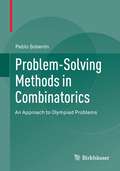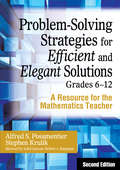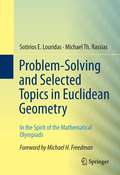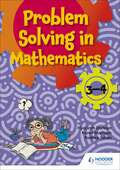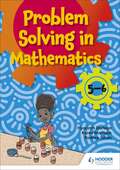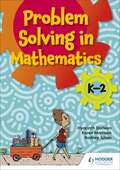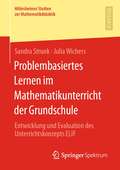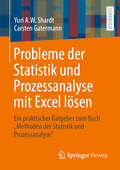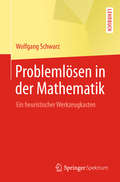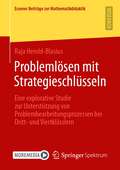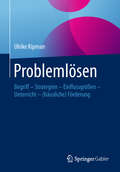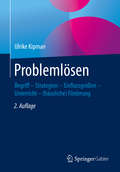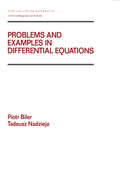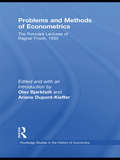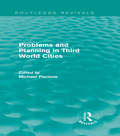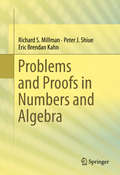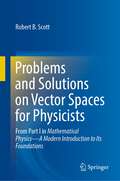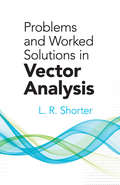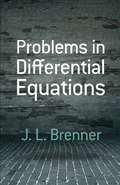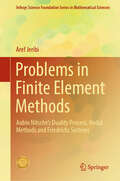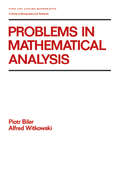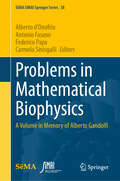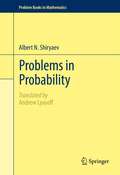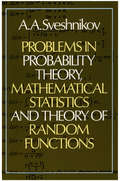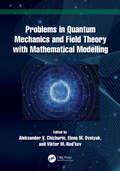- Table View
- List View
Problem-Solving Methods in Combinatorics
by Pablo SoberónEvery year there is at least one combinatorics problem in each of the major international mathematical olympiads. These problems can only be solved with a very high level of wit and creativity. This book explains all the problem-solving techniques necessary to tackle these problems, with clear examples from recent contests. It also includes a large problem section for each topic, including hints and full solutions so that the reader can practice the material covered in the book. The material will be useful not only to participants in the olympiads and their coaches but also in university courses on combinatorics.
Problem-Solving Strategies for Efficient and Elegant Solutions, Grades 6-12: A Resource for the Mathematics Teacher
by Alfred S. Posamentier Stephen KrulikThis updated edition presents ten strategies for solving a wide range of mathematics problems, plus new sample problems.
Problem-Solving and Selected Topics in Euclidean Geometry
by Michael Th. Rassias Sotirios E. Louridas"Problem-Solving and Selected Topics in Euclidean Geometry: in the Spirit of the Mathematical Olympiads" contains theorems which are of particular value for the solution of geometrical problems. Emphasis is given in the discussion of a variety of methods, which play a significant role for the solution of problems in Euclidean Geometry. Before the complete solution of every problem, a key idea is presented so that the reader will be able to provide the solution. Applications of the basic geometrical methods which include analysis, synthesis, construction and proof are given. Selected problems which have been given in mathematical olympiads or proposed in short lists in IMO's are discussed. In addition, a number of problems proposed by leading mathematicians in the subject are included here. The book also contains new problems with their solutions. The scope of the publication of the present book is to teach mathematical thinking through Geometry and to provide inspiration for both students and teachers to formulate "positive" conjectures and provide solutions.
Problem-solving 3-4
by Karen Morrison Hyacinth Dorleon Rodney JulienWe live in an increasingly technological and information-rich world. Education is focusingmore on enquiry and skills-based approaches. Students, even at the early levels ofschooling, are expected to develop a range of skills, including problem solving skills.Creative thinking, using information appropriately and problem solving are important for students in the school curriculum and in daily life. This book will help students learn how to apply mathematical skills in different contexts and explain how they got to their solutions.This book is easy for parents and teachers to use, and teaches multiple strategies forsolving problems, using challenging but supportive contexts. The approach is underpinnedby the Five E's approach to learning.The course will help student to:· Engage with problems meaningfully· Explore different options for approaching and solving problems· Explain how they are thinking· Elaborate on their working and processes and see connections between different areasof mathematics· Evaluate what worked and what didn't, learning from mistakes as well as successes
Problem-solving 5-6
by Karen Morrison Hyacinth Dorleon Rodney JulienWe live in an increasingly technological and information-rich world. Education is focusingmore on enquiry and skills-based approaches. Students, even at the early levels ofschooling, are expected to develop a range of skills, including problem solving skills.Creative thinking, using information appropriately and problem solving are important for students in the school curriculum and in daily life. This book will help students learn how to apply mathematical skills in different contexts and explain how they got to their solutions.This book is easy for parents and teachers to use, and teaches multiple strategies forsolving problems, using challenging but supportive contexts. The approach is underpinnedby the Five E's approach to learning.The course will help student to:· Engage with problems meaningfully· Explore different options for approaching and solving problems· Explain their thought processes · Elaborate on their working and processes and see connections between different areasof mathematics· Evaluate what worked and what didn't, learning from mistakes as well as successes
Problem-solving K-2
by Karen Morrison Hyacinth Dorleon Rodney JulienWe live in an increasingly technological and information-rich world. Education is focusing more on enquiry and skills-based approaches. Students, even at the early levels of schooling, are expected to develop a range of skills, including problem solving skills. Creative thinking and problem solving are not only important elements in the curriculum but they are also crucial in daily life. Students need to learn basic mathematical skills, but they also have to be able to apply these in unfamiliar contexts, communicate their thinking and explain how they got to their solutions. This book is easy for parents and teachers to use, and teaches multiple strategies for solving problems, using challenging but supportive contexts. The approach is underpinned by the Five E's approach to learning. The course will help student to: · Engage with problems meaningfully · Explore different options for approaching and solving problems· Explain how they are thinking· Elaborate on their working and processes and see connections between different areas of mathematics· Evaluate what worked and what didn't, learning from mistakes as well as successes.
Problembasiertes Lernen im Mathematikunterricht der Grundschule: Entwicklung und Evaluation des Unterrichtskonzepts ELIF (Hildesheimer Studien zur Mathematikdidaktik)
by Sandra Strunk Julia WichersELIF (Eigenständige Lernzielentwicklung und Inhaltserschließung am Fall) ist eine Unterrichtskonzeption, die ausgehend vom Problembasierten Lernen theoriebasiert entwickelt und mithilfe mehrerer Design-Based Research-Zyklen an die Anforderungen der Praxis angepasst wurde. Die Schüler entwickeln auf Grundlage eines Falls inhaltliche Lernziele in Form von Lernfragen, die sie sich selbstständig in individuellen und kooperativen Arbeitsphasen erarbeiten. Damit soll insbesondere die Fähigkeit zur selbstständigen Lebensbewältigung durch eine stärkere Anwendungs- und Schülerorientierung des Unterrichts gefördert werden.
Probleme der Statistik und Prozessanalyse mit Excel lösen: Ein praktischer Ratgeber zum Buch "Methoden der Statistik und Prozessanalyse"
by Yuri A.W. Shardt Carsten GatermannDieser praktische Ratgeber zum Buch „Methoden der Statistik und Prozessanalyse – Eine anwendungsorientierte Einführung“ gibt einen kompakten Überblick über die Nutzung von Excel zur Lösung typischer statistischer Fragestellungen. Neben kurzen Theorieteilen liegt der Fokus des Buchs auf detailliert dargestellten Excel Beispiele zur Lösung der Aufgaben. Weiterhin werden typische Abläufe für Standardaufgaben in Excel vorgestellt und erklärt. Kontrollfragen am Ende jedes Kapitels ermöglichen dem Lesenden, das erworbene Wissen selbstständig zu testen.
Problemlösen in der Mathematik: Ein heuristischer Werkzeugkasten
by Wolfgang SchwarzErinnern Sie sich an eine Alltagssituation, in der es Ihnen gelungen ist, aus einem Problem eine Aufgabe zu machen, die Sie erfolgreich bewältigen konnten? Und haben Sie dabei vom Einsatz geeigneter Werkzeuge profitiert? Solche Szenarien prägen den beruflichen Alltag aller Studierenden mathematischer Fachrichtungen. Man sieht sich permanent mit mathematischen Problemen konfrontiert, zu deren Lösung es einer guten Idee bedarf; oft findet man diese aber nicht, weil man sich der Werkzeuge nicht bewusst ist, mit denen man die Lösungsidee freilegen kann. Dieses Buch soll hier Abhilfe schaffen. Anhand von ca. 70 Beispielen aus der Diskreten Mathematik, der Arithmetik, der Zahlentheorie, der Stochastik, der Geometrie, der Linearen Algebra, der reellen Analysis, der Funktionentheorie, der Kombinatorik und der Mathematikgeschichte wird eine umfangreiche Auswahl heuristischer Vorgehensweisen erläutert, denen die Rolle des Werkzeugs in Problemlöseprozessen zufällt. Die heuristischen Strategien des Problemlösens werden strukturell systematisiert und nach Möglichkeit prozessual den verschiedenen Phasen des Problemlöseprozesses nach Pólya zugeordnet; dadurch entsteht nicht nur Ordnung im heuristischen Werkzeugkasten, sondern auch eine Verfeinerung des Pólya'schen Phasenmodells des Problemlösens.
Problemlösen mit Strategieschlüsseln: Eine explorative Studie zur Unterstützung von Problembearbeitungsprozessen bei Dritt- und Viertklässlern (Essener Beiträge zur Mathematikdidaktik)
by Raja Herold-BlasiusLernhilfen in Form von Hilfe- oder auch Tippkarten werden als Material zur Differenzierung im Unterricht eingesetzt. Ob diese Lernenden tatsächlich helfen, ist bisher unzureichend geklärt. Für die vorliegende Untersuchung dienen sog. Strategieschlüssel als Interventionsinstrument. Theoretisch ist zu vermuten, dass die Schlüssel den Einsatz von Strategien triggern und die Selbstregulation im Bearbeitungsprozess anregen. Im Kontext des mathematischen Problemlösens wird untersucht, auf welche Art und Weise die Strategieschlüssel den Problembearbeitungsprozess von Dritt- bis Viertklässlern beeinflussen. Die quantitativen Analysen ergeben einen statistisch hoch signifikanten Zusammenhang zwischen der Interaktion mit den Strategieschlüsseln, dem Heurismeneinsatz und dem Wechsel zwischen Episoden im Problembearbeitungsprozess. Die qualitativen Analysen zeigen, dass die Strategieschlüssel auf neun verschiedene Weisen genutzt werden, der Einsatz von Heurismen durch sie getriggert wird und dass selbstregulatorische Tätigkeiten angeregt werden. Bei der Verwendung der Strategieschlüssel werden neun Muster identifiziert.
Problemlösen: Begriff – Strategien – Einflussgrößen – Unterricht – (häusliche) Förderung
by Ulrike KipmanProblemlösen gilt als eine der Schlüsselqualifikationen des 21. Jahrhunderts. Es geht beim Problemlösen nicht nur darum, Informationen sinnvoll zu vernetzen, dynamisch in Beziehung zu setzen, Wahrscheinlichkeiten zu berechnen und eine Kette richtiger Entscheidungen zu treffen, sondern auch vielfach darum, eine Vielzahl an Außenkriterien zu berücksichtigen und ein entsprechendes „Weltwissen“ an den Tag zu legen. Dieses Buch soll die Frage beantworten, wie man zu einem guten Problemlöser / einer guten Problemlöserin werden kann bzw. warum bestimmte Personen bei der Lösung von Problemen erfolgreicher sind als andere. Nach einer umfassenden Zusammenstellung der Literatur zu diesem Thema werden Einflussgrößen auf das Problemlösen analysiert und miteinander abgeglichen und Ideen für den Unterricht in der Primarstufe und Sekundarstufe I präsentiert. Zudem werden verschiedene Arten des Unterrichts im Hinblick auf die Wirksamkeit für unterschiedliche Personengruppen diskutiert, dies vor dem Hintergrund, dass nicht nur Problemstellungen stark variieren sondern auch die Problemlöser/innen. Eine Handreichung mit Brettspielen, die die Kriterien des Problemlösens erfüllen, ist ebenfalls Teil dieses Buches. Letztendlich wird ein Modell vorgeschlagen, welches erfolgreiches Problemlösen vielschichtig zu erklären versucht.
Problemlösen: Begriff – Strategien – Einflussgrößen – Unterricht – (häusliche) Förderung
by Ulrike KipmanProblemlösen gilt als eine der Schlüsselqualifikationen des 21. Jahrhunderts. Es geht beim Problemlösen nicht nur darum, Informationen sinnvoll zu vernetzen, dynamisch in Beziehung zu setzen, Wahrscheinlichkeiten zu berechnen und eine Kette richtiger Entscheidungen zu treffen, sondern auch vielfach darum, eine Vielzahl an Außenkriterien zu berücksichtigen und ein entsprechendes „Weltwissen“ an den Tag zu legen. Dieses Buch soll die Frage beantworten, wie man zu einem guten Problemlöser / einer guten Problemlöserin werden kann bzw. warum bestimmte Personen bei der Lösung von Problemen erfolgreicher sind als andere. Nach einer umfassenden Zusammenstellung der Literatur zu diesem Thema werden Einflussgrößen auf das Problemlösen analysiert und miteinander abgeglichen und Ideen für den Unterricht in der Primarstufe und Sekundarstufe I präsentiert. Zudem werden verschiedene Arten des Unterrichts im Hinblick auf die Wirksamkeit für unterschiedliche Personengruppen diskutiert, dies vor dem Hintergrund, dass nicht nur Problemstellungen stark variieren sondern auch die Problemlöser/innen. Eine Handreichung mit Brettspielen, die die Kriterien des Problemlösens erfüllen, ist ebenfalls Teil dieses Buches. Letztendlich wird ein Modell vorgeschlagen, welches erfolgreiches Problemlösen vielschichtig zu erklären versucht. In der 2. Auflage wurden alle Kapitel überarbeitet und an den neuesten Kenntnisstand zum Thema Problemlösen angepasst. Die Kapitel zur schulischen und häuslichen Förderung der Problemlösekompetenz wurden stark erweitert und es werden nun eine Vielzahl an neuen Aufgaben und Spielen präsentiert, die beim Fördern von Problemlösen eine wertvolle Unterstützung leisten können. Das Kapitel zur Kombinatorik wurde nach der Rückmeldung von Studierenden und Kollegen komplett umstrukturiert und ist nun verständlicher und übersichtlicher aufgebaut.
Problems and Examples in Differential Equations
by Piotr Biler Tadeusz NadziejaThis book presents original problems from graduate courses in pure and applied mathematics and even small research topics, significant theorems and information on recent results. It is helpful for specialists working in differential equations.
Problems and Methods of Econometrics: The Poincaré Lectures of Ragnar Frisch 1933 (Routledge Studies in the History of Economics)
by Ragnar FrischThe development of economics changed dramatically during the twentieth century with the emergence of econometrics, macroeconomics and a more scientific approach in general. One of the key individuals in the transformation of economics was Ragnar Frisch, professor at the University of Oslo and the first Nobel Laureate in economics in 1969. He was a co-founder of the Econometric Society in 1930 (after having coined the word econometrics in 1926) and edited the journal Econometrics for twenty-two years. The discovery of the manuscripts of a series of eight lectures given by Frisch at the Henri Poincaré Institute in March–April 1933 on The Problems and Methods of Econometrics will enable economists to more fully understand his overall vision of econometrics. This book is a rare exhibition of Frisch’s overview on econometrics and is published here in English for the first time. Edited and with an introduction by Olav Bjerkholt and Ariane Dupont-Kieffer, Frisch’s eight lectures provide an accessible and astute discussion of econometric issues from philosophical foundations to practical procedures. Concerning the development of economics in the twentieth century and the broader visions about economic science in general and econometrics in particular held by Ragnar Frisch, this book will appeal to anyone with an interest in the history of economics and econometrics.
Problems and Planning in Third World Cities (Routledge Revivals)
by Michael PacioneWhen this title was first published in 1981, growing concern for the future of cities and those who inhabited them, stimulated by trends in global urbanisation, had resulted in much emphasis being placed on a problem-solving approach to the study of the city. The chapters in this edited collection, a companion to Urban Problems and Planning in the Developed World (Routledge Revivals, 2013), consider the problems and planning activities in a number of cities across the world. Varied case-studies, including Mexico City, Bogota and Shanghai, reflect the differing economic, cultural and political regimes of the modern world and ensure the continued value of this comprehensive work.
Problems and Proofs in Numbers and Algebra
by Richard S. Millman Peter J. Shiue Eric Brendan KahnFocusing on an approach of solving rigorous problems and learning how to prove, this volume is concentrated on two specific content themes, elementary number theory and algebraic polynomials. The benefit to readers who are moving from calculus to more abstract mathematics is to acquire the ability to understand proofs through use of the book and the multitude of proofs and problems that will be covered throughout. This book is meant to be a transitional precursor to more complex topics in analysis, advanced number theory, and abstract algebra. To achieve the goal of conceptual understanding, a large number of problems and examples will be interspersed through every chapter. The problems are always presented in a multi-step and often very challenging, requiring the reader to think about proofs, counter-examples, and conjectures. Beyond the undergraduate mathematics student audience, the text can also offer a rigorous treatment of mathematics content (numbers and algebra) for high-achieving high school students. Furthermore, prospective teachers will add to the breadth of the audience as math education majors, will understand more thoroughly methods of proof, and will add to the depth of their mathematical knowledge. In the past, PNA has been taught in a "problem solving in middle school" course (twice), to a quite advanced high school students course (three semesters), and three times as a secondary resource for a course for future high school teachers. PNA is suitable for secondary math teachers who look for material to encourage and motivate more high achieving students.
Problems and Solutions on Vector Spaces for Physicists: From Part I in Mathematical Physics—A Modern Introduction to Its Foundations
by Robert B. ScottThis book offers supporting material for the comprehensive textbook Mathematical Physics—A Modern Introduction to Its Foundations authored by Sadri Hassani. The book covers mathematical preliminaries and all of Part I in Hassani’s textbook. The subjects covered here include the key topics necessary for physicists to form a solid mathematical foundation: vectors and linear maps, algebras, operators, matrices, and spectral decomposition. In particular, the vector space concept is a central unifying theme in later chapters of Hassani’s textbook. Detailed solutions are provided to one third of the end-of-chapter exercises in the first six chapters of his text. The present volume helps upper-undergraduate and early postgraduate physics students deepen their understanding of the mathematics that they encounter in physics, learn physics more efficiently, and use mathematics with more confidence and creativity. The content is thus presented rigorously but remains accessible to physics students. New exercises are also proposed, some with solutions, some without, so that the total number of unsolved exercises remains unchanged. They are chosen to help explain difficult concepts, amplify key points in Hassani's textbook, or make further connections with applications in physics. Taken together with Hassani's work, the two form a self-contained set and the solutions make detailed reference to Hassani's text. The solutions also refer to other mathematics and physics textbooks, providing entry points to further literature that finds a useful place in the physicist's personal library.
Problems and Worked Solutions in Vector Analysis (Dover Books on Mathematics)
by L. R. Shorter"A handy book like this," noted The Mathematical Gazette, "will fill a great want." Devoted to fully worked out examples, this unique text constitutes a self-contained introductory course in vector analysis for undergraduate and graduate students of applied mathematics.Opening chapters define vector addition and subtraction, show how to resolve and determine the direction of two or more vectors, and explain systems of coordinates, vector equations of a plane and straight line, relative velocity and acceleration, and infinitely small vectors. The following chapters deal with scalar and vector multiplication, axial and polar vectors, areas, differentiation of vector functions, gradient, curl, divergence, and analytical properties of the position vector. Applications of vector analysis to dynamics and physics are the focus of the final chapter, including such topics as moving rigid bodies, energy of a moving rigid system, central forces, equipotential surfaces, Gauss's theorem, and vector flow.
Problems in Differential Equations (Dover Books on Mathematics)
by J. L. BrennerA supplement for elementary and intermediate courses in differential equations, this text features more than 900 problems and answers. Suitable for undergraduate students of mathematics, engineering, and physics, this volume also represents a helpful tool for professionals wishing to brush up on their problem-solving skills.The book is divided into twenty sections, each preceded by a clear and logical explanation of the basic ideas needed for solving the problems within the section. Many fully explained illustrative problems appear throughout the text. Subjects include applied routine and nonroutine problems in vibrations, electrical engineering, mechanics, and physics. Stars indicate advanced problems. Short mathematical and numerical tables are provided at the end of the book.
Problems in Finite Element Methods: Aubin Nitsche’s Duality Process, Nodal Methods and Friedrichs Systems (Infosys Science Foundation Series)
by Aref JeribiThis book discusses major topics and problems in finite element methods. It is targeted to graduate students and researchers in applied mathematics, physics, and engineering, wishing to learn and familiarize themselves with finite element theory. The book describes the nodal method for squares or rectangles and triangles, as well as an increase of the error between exact solution and approximate solution. It discusses an approximation of positive symmetric first-order systems in the Friedrichs sense by finite element methods. In addition, the book also explains the continuous and discontinuous approximation methods, adapted to the structure of the transport equation, leading to linear systems of quasi-explicit resolution, and therefore commonly used in practice.
Problems in Mathematical Analysis (Pure and Applied Mathematics #132)
by Piotr Biler Alfred WitkowskiChapter 1 poses 134 problems concerning real and complex numbers, chapter 2 poses 123 problems concerning sequences, and so it goes, until in chapter 9 one encounters 201 problems concerning functional analysis. The remainder of the book is given over to the presentation of hints, answers or referen
Problems in Mathematical Biophysics: A Volume in Memory of Alberto Gandolfi (SEMA SIMAI Springer Series #38)
by Antonio Fasano Alberto D’Onofrio Federico Papa Carmela SinisgalliThe book "Problems in Mathematical Biophysics - a volume in memory of Alberto Gandolfi" aims at reviewing the current state of the art of the mathematical approach to various areas of theoretical biophysics. Leading authors in the field have been invited to contribute, having a strong appreciation of Alberto Gandolfi as a scientist and as a man and sharing his same passion for biology and medicine, as well as his style of investigation. Encompassing both theoretical and practical aspects of Mathematical Biophysics, the topics covered in this book span a spectrum of different problems, in biology, and medicine, including population dynamics, tumor growth and control, immunology, epidemiology, ecology, and others. As a result, the book offers a comprehensive and current overview of compelling subjects and challenges within the realm of mathematical biophysics. In their contributions, the authors have effectively conveyed not only their research findings but also their peculiar perspective and approach to problem-solving, dealing with oncology, epidemiology, neuro-sciences, and biochemistry. The chapters pertain to a wide array of mathematical areas such as continuous Markov chains, partial differential equations, kinetic theory, applied statistical mechanics, noise-induced transitions, and many others.
Problems in Probability
by Albert N. Shiryaev Andrew LyasoffFor the first two editions of the book Probability (GTM 95), each chapter included a comprehensive and diverse set of relevant exercises. While the work on the third edition was still in progress, it was decided that it would be more appropriate to publish a separate book that would comprise all of the exercises from previous editions, in addition to many new exercises. Most of the material in this book consists of exercises created by Shiryaev, collected and compiled over the course of many years while working on many interesting topics. Many of the exercises resulted from discussions that took place during special seminars for graduate and undergraduate students. Many of the exercises included in the book contain helpful hints and other relevant information. Lastly, the author has included an appendix at the end of the book that contains a summary of the main results, notation and terminology from Probability Theory that are used throughout the present book. This Appendix also contains additional material from Combinatorics, Potential Theory and Markov Chains, which is not covered in the book, but is nevertheless needed for many of the exercises included here.
Problems in Probability Theory, Mathematical Statistics and Theory of Random Functions
by A. A. SveshnikovProblem solving is the main thrust of this excellent, well-organized workbook. Suitable for students at all levels in probability theory and statistics, the book presents over 1,000 problems and their solutions, illustrating fundamental theory and representative applications in the following fields: Random Events; Distribution Laws; Correlation Theory; Random Variables; Entropy & Information; Markov Processes; Systems of Random Variables; Limit Theorems; Data Processing; and more.The coverage of topics is both broad and deep, ranging from the most elementary combinatorial problems through limit theorems and information theory. Each chapter introduction sets forth the basic formulas and a general outline of the theory necessary for the problems that follow. Next comes a group of sample problems and their solutions, worked out in detail, which serve as effective orientation for the exercises to come.The emphasis on problem solving and the multitude of problems presented make this book, translated from the Russian, a valuable reference manual for scientists, engineers, and computer specialists, as well as a comprehensive workbook for undergraduates in these fields.
Problems in Quantum Mechanics and Field Theory with Mathematical Modelling
by Aleksander V. Chichurin Elena M. Ovsiyuk Viktor M. Red’kovIn Problems in Quantum Mechanics and Field Theory with Mathematical Modelling, a number of exactly solvable problems in electrodynamics and in quantum-mechanics of particles with different spins are presented.The main topics covered include: the Cox scalar particle with intrinsic structure in presence of the magnetic field in the spaces of constant curvature, Euclid, Riemann, and Lobachevsky; Cox particle in the Coulomb field; tunneling effect through Schwarzschild barrier for a spin 1/2 particle; electromagnetic field in Schwarzschild space-time, the Majorana - Oppenheimer approach in electrodynamics; scalar particle with polarizability in the Coulomb field; Dirac particle in the Coulomb field on the background of hyperbolic Lobachevsky and spherical Riemann models; particle with spin 1 in the Coulomb field; geometrical modeling of the media in Maxwell electrodynamics; P-asymmetric equation for a spin 1/2 particle; fermion with two mass parameters in the Coulomb field; helicity operator for a spin 2 particle in presence of the magnetic field.The book will be of interest to researchers, and is accessible enough to serve as a self-study resources for courses at undergraduate and graduate levels.
